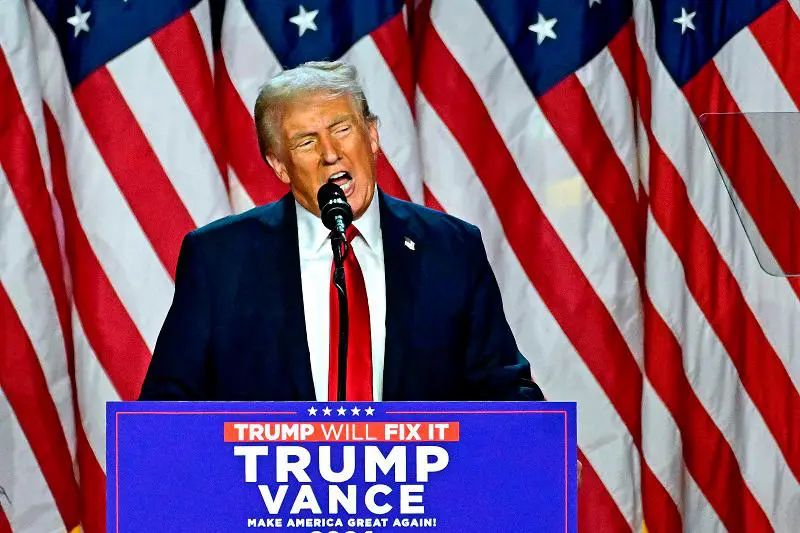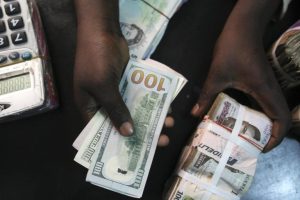
The possibility of Donald Trump returning to the White House as the 47th President of the United States, after a significant win over Kamala Harris, raises fresh concerns for Nigeria’s economic future.
Trump’s economic strategies, centered around his “America First” doctrine, prioritize boosting domestic energy production, imposing tariffs on imports, and pushing for low interest rates.
These policies are likely to influence Nigeria’s economy in various ways, particularly affecting the exchange rate, capital flows, inflation, and immigration patterns. Below is a breakdown of how these changes could impact Nigeria’s economic scenario.
Key Points:
- Trump’s second term could have far-reaching consequences for Nigeria’s economy.
- A stronger U.S. dollar, potential capital outflows, and low global oil prices may lead to heightened exchange rate volatility, putting pressure on the naira and fueling inflation.
- Stricter immigration policies might reduce remittance inflows, while changes in U.S. foreign policy could affect Nigeria’s security and development assistance.
- Nigerian policymakers may need to adopt new strategies, such as enhancing regional trade, boosting non-oil exports, and pursuing structural reforms to offset the challenges posed by Trump’s policies.
Exchange Rate Pressures from a Stronger Dollar
Trump’s trade policies could strengthen the U.S. dollar, especially if tariffs are imposed to increase demand for domestically produced goods.
A stronger dollar would raise the cost of acquiring foreign exchange for Nigeria, potentially challenging the Central Bank of Nigeria (CBN) in its efforts to stabilize the naira. With the naira already depreciating by over 45% this year, a stronger dollar could further devalue the currency, affecting import costs, inflation, and purchasing power.
Additionally, a stronger dollar increases Nigeria’s debt-servicing costs, as a significant portion of Nigeria’s debt is dollar-denominated. This could also worsen inflationary pressures, particularly since Nigeria heavily depends on imports for fuel, raw materials, and consumer goods.
Interest Rates and Capital Flows to Nigeria
Trump has historically favored low interest rates, pushing the Federal Reserve to maintain loose monetary policies even during economic growth periods. In his first term, the Fed raised rates to 2.5% in 2018 before slashing them near zero to counteract COVID-19’s economic effects.
Trump’s renewed push for lower rates could again steer the Fed’s decisions. If rates remain low, capital might flow out of the U.S. in search of higher returns in emerging markets, such as Nigeria.
Between 2016 and 2020, Nigeria saw significant foreign investment, with the highest inflows recorded in 2019 at $23 billion. Should a low-interest-rate environment persist, Nigeria could attract more U.S.-based capital, especially if it offers higher yields through debt instruments. This influx would ease foreign exchange pressure and help stabilize the naira.
Inflation and Energy Policies
Trump’s focus on expanding U.S. domestic oil production and reducing dependence on foreign energy sources could lead to sustained low global oil prices. During his first term, his policies, coupled with the COVID-19 pandemic, caused a sharp drop in WTI crude oil prices, impacting global energy markets.
As Nigeria depends heavily on oil exports for government revenue and foreign exchange, continued low oil prices could destabilize the budget and fuel inflation. Additionally, Trump’s proposed tariffs on Chinese imports could lead to higher U.S. inflation, which might spill over to Nigeria, raising the cost of imports like machinery, pharmaceuticals, and agricultural products.
Immigration and the Nigerian Diaspora
Trump’s return could revive concerns regarding U.S. immigration policies, particularly restrictions imposed on Nigerians during his first term, citing national security risks. If such policies are reinstated, they could limit Nigerians’ ability to study, work, or visit the U.S., which would reduce remittance flows—a vital source of foreign exchange for Nigeria.
With remittances exceeding $20 billion annually, a drop in these inflows would put additional strain on Nigeria’s foreign reserves and reduce domestic consumption, exacerbating Nigeria’s financial challenges.
Geopolitical Shifts and U.S. Aid to Nigeria
Trump’s “America First” approach meant reduced foreign aid, particularly to African nations. This could have serious implications for Nigeria, which depends on U.S. military and development assistance to combat insurgencies like Boko Haram.
If military aid and development programs are cut back, Nigeria may face challenges in addressing regional security issues and advancing crucial social programs. A reduction in U.S. aid would likely require Nigeria to increase its own spending on security and development, diverting funds from other essential areas.
Trade Policies and Nigeria-U.S. Exports
Trump’s focus on reducing imports through tariffs could affect trade relations with Nigeria. While Nigeria currently enjoys a trade surplus with the U.S., a reduction in imports from Nigeria could hurt export revenues, particularly from key sectors like oil, minerals, and agriculture.
A decrease in U.S. imports from Nigeria could lead to a weakened current account balance, further complicating Nigeria’s exchange rate and foreign reserve challenges.





